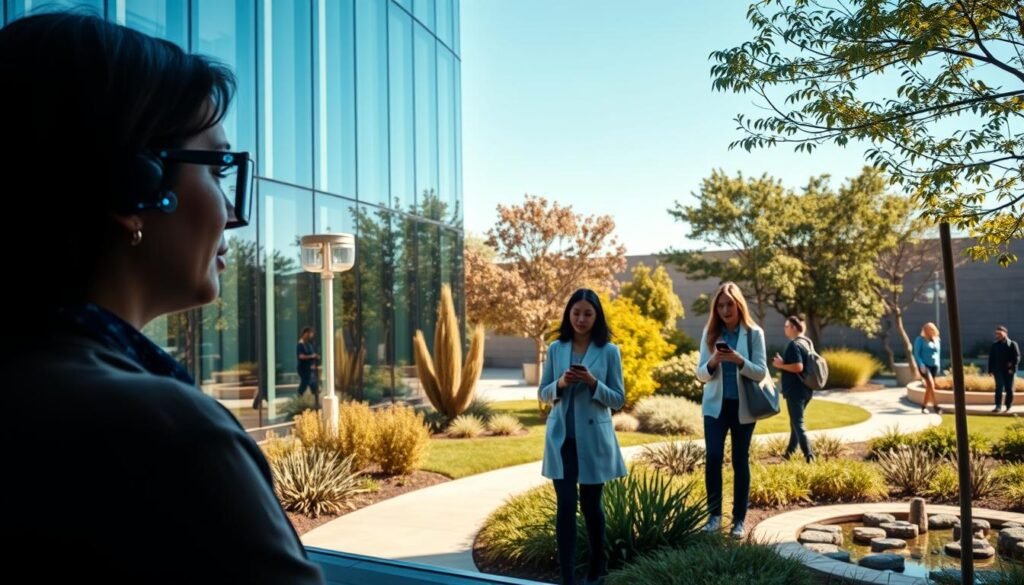Mental Health Innovation: Transforming Care
Imagine a world where support systems adapt to meet individual needs instead of relying on outdated methods. This shift is happening now, blending time-tested approaches with digital tools to create accessible, personalized strategies. From apps that track emotional patterns to virtual therapy sessions, these advances are redefining how we address well-being challenges.
Experts like Professor Peter Fonagy at University College London highlight the importance of early intervention for young people. His research shows how tailored programs can build resilience during critical developmental stages. Similarly, Dr. Bonnie Nagel’s work demonstrates how combining neuroscience with community outreach improves outcomes for diverse groups.
Data plays a key role in shaping these breakthroughs. Clinicians now use real-time analytics to refine treatment plans and predict risks more accurately. Events like the American Psychiatric Association’s MHIZ showcase how collaborative efforts between researchers and tech developers lead to scalable solutions.
This article explores the latest tools, community-driven research, and expert perspectives driving this evolution. Whether you’re a caregiver, professional, or simply curious, you’ll discover practical insights into today’s most impactful care advancements.
Key Takeaways
- Digital tools and traditional methods are merging to create adaptable support systems.
- Early intervention strategies improve long-term outcomes for young individuals.
- Data analytics help professionals make precise, personalized care decisions.
- Collaborative events foster innovation across clinical and tech fields.
- Community-focused research ensures solutions work for diverse populations.
Introduction to Modern Mental Health Innovation
Recent breakthroughs are reshaping how we approach well-being, moving beyond one-size-fits-all methods. By blending new research with digital tools, professionals now create tailored strategies that adapt to individual needs. This shift addresses gaps in traditional systems, offering hope for those who felt underserved.

Understanding the Evolving Landscape
Emerging studies reveal how early support shapes lifelong outcomes. Professor Peter Fonagy’s work highlights programs designed for young individuals, focusing on emotional resilience during pivotal growth phases. His findings, published by The Health Foundation, stress the need for flexible frameworks that grow with users.
Key Advancements Driving Progress
Three developments stand out:
- Real-time data tracking helps teams spot patterns and adjust care plans faster
- Collaborative platforms connect specialists, educators, and families seamlessly
- AI-driven tools analyze language to predict risks before crises occur
These tools thrive when paired with human expertise. Clinicians using shared databases report 30% faster response times in critical cases. As one therapist noted, “It’s not about replacing face-to-face work—it’s about enhancing what we do best.”
Advancing Mental health innovation Through Technology
The fusion of digital tools and clinical expertise is creating unprecedented opportunities in modern support systems. Events like the American Psychiatric Association’s Mental Health Innovation Zone (MHIZ) highlight this shift, bringing professionals together to explore tech-driven solutions.
Interactive Features Redefining Collaboration
Scheduled for May 17-20, 2025, the MHIZ offers hands-on workshops and panel discussions led by top researchers. Attendees test new tools like emotion-tracking wearables and AI-powered therapy platforms. “This isn’t just a conference—it’s a lab for tomorrow’s breakthroughs,” notes Dr. Rebecca Brendel, APA President.
Tech-Driven Clinical Strategies
Three innovations are changing daily practice:
- Virtual reality exposure therapy for anxiety management
- Machine learning models predicting medication responses
- Secure apps enabling real-time provider-patient communication
These tools require robust funding and precise data collection. A 2024 study showed clinics using integrated systems reduced wait times by 40% while improving accuracy.
| Traditional Methods | Tech-Enhanced Solutions | Impact |
|---|---|---|
| Paper-based assessments | AI-driven diagnostics | 23% faster evaluations |
| In-person sessions only | Hybrid care platforms | 58% wider reach |
| Generic treatment plans | Personalized algorithms | 35% better outcomes |
By combining human insight with technological precision, teams can address complex needs more effectively than ever before.
Integrating Cutting-Edge Treatments and Support Systems
Today’s care strategies are merging proven therapies with smart digital tools, creating seamless support networks. This blend helps individuals navigate challenges while maintaining human connection at every step.

Innovative Treatment Methods and Digital Platforms
New systems simplify the journey from initial screening to long-term management. Apps now let users share symptoms with their care team instantly, while VR modules recreate real-world scenarios to build coping skills safely.
Three features stand out:
- Automated progress tracking that alerts providers to subtle changes
- Secure portals where families coordinate with specialists
- Gamified exercises reinforcing therapy goals between sessions
Skilled teams use real-world data to refine these tools. One clinic reported 42% fewer missed appointments after introducing reminder bots. “Technology handles logistics so we focus on deeper work,” explains a nurse practitioner from Boston.
Better access means rural patients now video-chat with top experts, and multilingual interfaces break language barriers. These advances prove that thoughtful tech integration strengthens—not replaces—the heart of care.
Expert Insights from Leading Mental Health Innovators
What happens when decades of research meet real-world challenges? Pioneers like Professor Peter Fonagy and Dr. Bonnie Nagel are answering this question through work that bridges academic rigor with practical care solutions. Their approaches highlight how customized strategies and community collaboration can transform outcomes.

Redesigning Support for Younger Generations
Professor Fonagy’s studies reveal a critical truth: early, adaptable interventions help young people build lifelong resilience. His team developed school-based programs that adjust to each student’s emotional needs. “We’re moving from rigid protocols to flexible frameworks,” he explains. These initiatives reduced crisis incidents by 29% in trial schools by teaching coping skills through peer-led activities.
Precision Through Longitudinal Data
Dr. Nagel’s 15-year study tracks how biological and environmental factors influence well-being. Her team identified patterns that predict specific conditions, enabling earlier, more targeted care. Clinics using her models report 37% better accuracy in treatment matching. “Data isn’t just numbers—it’s stories waiting to guide us,” she notes.
Both experts stress that progress requires sustained funding and community partnerships. Fonagy’s programs now operate in 12 states, while Nagel’s tools help rural clinics overcome staffing shortages. Together, they prove that blending science with empathy creates lasting change.
Bridging Research and Community Care for Future Mental Health
Communities nationwide are witnessing a quiet revolution where science meets sidewalk-level support. Groundbreaking studies now fuel practical solutions that reach kitchens, schools, and neighborhood centers.
From Longitudinal Studies to Real-World Applications
Take the ABCD Study, tracking 12,000 U.S. adolescents since 2015. Dr. Bonnie Nagel’s team found sleep patterns predict emotional challenges years before symptoms emerge. Clinics now use this data to create school-based sleep education programs. “We’re turning observations into action plans that prevent crises,” notes a Portland social worker.
Three ways research shapes daily practice:
- Training toolkits help teachers spot early signs using science-backed checklists
- Mobile clinics bring genetic testing to rural areas to personalize care approaches
- Community boards review study findings to design local outreach campaigns
In Oregon, ABCD data helped pass laws funding teen wellness centers. These hubs reduced ER visits by 18% in two years by connecting youth to tailored resources. Teams blend academic insights with cultural knowledge—like combining trauma therapy with indigenous healing traditions in Navajo Nation programs.
“Research stays relevant when it listens to sidewalk stories as much as lab data.”
By closing the gap between labs and living rooms, communities build data-driven care models that evolve with real needs. This partnership ensures tomorrow’s breakthroughs grow from today’s front-line experiences.
Conclusion
The journey toward better care systems shows how blending tools and teamwork creates lasting change. From real-time data analysis to virtual support platforms, these advances help people thrive by matching care to their unique needs. Experts like Dr. Nagel prove that combining research with grassroots efforts builds solutions that work where they matter most.
Three lessons stand out. First, technology amplifies human expertise—think AI spotting risks or apps bridging care gaps. Second, community-driven strategies ensure no one gets left behind. Finally, ongoing collaboration between labs and neighborhoods keeps progress grounded in real-world results.
Looking ahead, the focus remains on adaptability. Schools using sleep studies to prevent crises or clinics personalizing treatments through genetic data prove what’s possible. Every step forward relies on professionals and communities joining forces to refine what works.
Ready to be part of this shift? Share ideas, support local programs, or explore new tools. Together, we can build systems that grow with those they serve—today and tomorrow.
FAQ
How is technology reshaping psychiatric care today?
Advances like AI-driven diagnostics, teletherapy platforms, and digital symptom trackers are streamlining personalized treatment. Tools such as the Mental Health Innovation Zone (MHIZ) foster collaboration between clinicians and tech developers to create scalable solutions.
What role do digital platforms play in treatment accessibility?
Apps like Woebot and platforms such as Talkspace bridge gaps in care by offering 24/7 support, self-guided resources, and remote counseling. These tools reduce wait times and provide immediate help for those in underserved areas.
How does research influence community-based care programs?
Studies led by experts like Dr. Bonnie Nagel translate findings into practical strategies. For example, her work on adolescent brain development informs school interventions and outreach initiatives tailored to high-risk youth populations.
Can new therapies replace traditional methods entirely?
While innovations like VR exposure therapy or transcranial magnetic stimulation show promise, they often complement—not replace—established approaches. Integration depends on individual needs and clinical evidence, as emphasized by Professor Peter Fonagy’s work.
What barriers exist in adopting cutting-edge treatments widely?
Challenges include uneven insurance coverage, clinician training gaps, and data privacy concerns. Partnerships between institutions like the NIH and private firms aim to address these through funding and standardized protocols.
How do longitudinal studies improve future care models?
Tracking patient outcomes over decades—such as the ABCD Study—helps identify early risk factors and preventive measures. This data guides policymakers in allocating resources to programs with proven long-term impact.
Share this content:




Post Comment